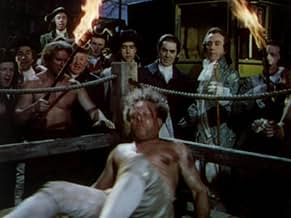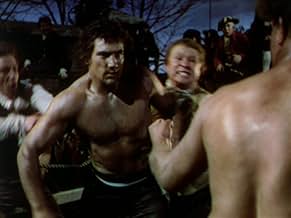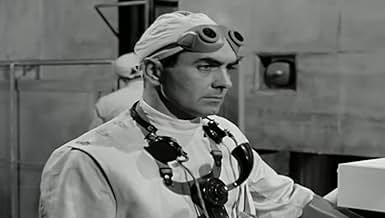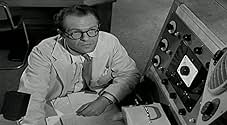IMDb RATING
7.0/10
1.1K
YOUR RATING
A scientist obsessed with the past transports himself back in time to 18th-century London, where he falls in love with a beautiful young woman.A scientist obsessed with the past transports himself back in time to 18th-century London, where he falls in love with a beautiful young woman.A scientist obsessed with the past transports himself back in time to 18th-century London, where he falls in love with a beautiful young woman.
Ronald Adam
- Dr. Ronson
- (uncredited)
Robert Atkins
- Dr. Samuel Johnson
- (uncredited)
Felix Aylmer
- Sir William, the Physician
- (uncredited)
Hamlyn Benson
- Bow Street magistrate
- (uncredited)
Katie Boyle
- Girl
- (uncredited)
Richard Carrickford
- Bow Street Runner
- (uncredited)
Jill Clifford
- Maid
- (uncredited)
Arthur Denton
- Loonies' Driver
- (uncredited)
Peter Drury
- Policeman
- (uncredited)
Featured reviews
I first saw this movie as a child and loved it. In the mid 60's the movie was shown on The Late Show, and unfortunately I was able to watch only part of it. I have looked for it since, but over time had forgotten the movie's name. I remembered only the plot and the stars. I came across a Tyrone Power website recently which led me to this website where my memory was refreshed and my appetite whetted. I find, however, that this movie is not available for purchase. Shame, Shame!! I would love to see it again, in its entirety.
I saw this movie "I'll Never Forget You", about 20 year ago and it was very entertaining. The story was very fresh ,in the sense that it was not a retread as we are all use to now a days. I would go as far as to say, it's one of the best fantasy / dramas of 20th century film making. Tyrone Power and Ann Blight performances make us believe their characters. The fantasy and drama of this film really comes through. I ,for one, would like to see it re-released on DVD, so young people could get a chance to see it. You know, the violence, we call movie making now days, is not conducive to entertainment or brain power. This movie is entertaining and leaves room for thought.
This is a powerful and disturbing film. Its fantasy-for-the-sake-of-idea storyline sends a man back in time to the days of Samuel Johnson, Boswell, and the England of the bygone era. The time traveling scientist is played most ably by Tyrone Power. He falls in love back in time, runs afoul of those who wonder how he can know the future, and is compelled to return to his own era. This film was adapted from John Balderston's eerie play "Berkeley Square" by Ranald Macdougall. The director of this beautiful; B/W dramatic gem was Roy Baker. In the cast along with Power were Ann Blyth, Michael Rennie, Kathleen Byron, Beatrice Capmbell, Irene Browne, Raymond Huntley, Felix Aylmer, Ronald Adam, Robert Atkins, Alex McCrindle, Ronald Simpson and many more. Whenever the time traveler makes an error in tenses, the 18th Century denizens grow afraid of him, wondering if he is a witch or a madman. But he is able to see and converse with Sir Joshua Reynolds, Samuel Johnson, Boswell and others; and the time traveler returns home to an even stranger ending than he had imagined--or that the viewers could have guessed. The film boasts very fine music by William Alwyn, wonderful costumes by Margaret Furse and art direction by C.P. Norman that is a delight to behold. This is a powerful production, unforgettable, and a bit unusual until one gets used to it. The B/W sets look densely photographed and very convincing; for some reason, the feature hard-to-find in this country but not to be missed if you get the opportunity. Also known as "The House On the Square".
I saw this movie years ago and it has stuck with me as one of the best.I have tried for years to see it again but have not been able to find it. If you ever see it you will love it. It is sensitive ,romantic, with a little time travel,reincarnation flavor thrown in. If you liked this movie i would suggest you see, The Two Worlds Of Jenny Logan and Somewhere In Time.
Based on John L. Balderston play Berkeley square that was also loosely based on Henry James unfinished novel The sense of the past and a remake of the 1933 film of the same title starring Leslie Howard. The movie begins almost as a sci-fi film in a laboratory where scientifics Michael Rennie and Tyrone Power work doing atomic tests and follows as a mystery noir when they arrive to Power old XVIII mansion in Berkeley square. There, watching the surprising similarity between a Power XVIII century ancestor's portrait and he, he begans to explain to his friend a theory about returning to XVIII century, "the age of reason, of dignity and grace, of quietness and peace", as he says. As Rennie leaves the house a thunderstorm falls and time travel begins...
As the movie moves on we have a glimpse of what XVIII century really was aside of Power romanticized notions: an obscure time, full of social injustices, children work and misery as well as the illustrated era that produced men like Joshua Reynolds, dr. Johnson and James Boswell. But how did the bad things have changed if progress advances arrived sooner than they really did?
Although this "historical" part of the story is not enough developed in favor of a love story, the film presents an interesting reflection about past times looking better than they really were. Authenticity is captured by accurated sets of XVIII London (reconstructed in London Denham studios) show a dirty, poor city with enormous social and class gaps. Even the "smell" of the poor city is noticed in a scene. In a nice scene Tyrone Power character goes to the poorer part of the city and can not stand the "smell" of it, putting some perfume drops in a handkerchief to avoid it. We also see the making of the matches, that did not in fact appear until XIX century. There is a bright scene referring to Georgians' lack of hygiene when everybody gets scandalized when knowing Power takes a bath averyday!
Excellent costumes designed by Margart Furse and splendid house interiors that bring a past century in all its splendor, the house becoming a character in its own right.
Filmed in England, Tyrone Power did a research on XVIII century by reading James Boswell writings Life of Samuel Johnson (dr. Johnson's most accomplished biography) as well as his London Journal, learning British customs and habits of that era.
As a curious note, when searching Georgian furniture for the movie in London, British dealers stated that they were practically cleaned out of pre-regency stock furniture by American antique hunters, estimating that more Americans than British owned Georgian furniture, making difficult to obtain pieces for the movie at affordable price.
Two scientists (E. N. Tiratsoo and I. S. Hallows, of an enterprise related to nuclear energy development) advised the studio on how to built the atomical research station.
Actor Raymond Huntley, who plays Helens's fiancee played 1970's BBC series Upstairs & Downstairs family solicitor sir Geoffrey.
Although I would have changed the ending for a more suitable one. Since there is no mention to Helen in Standish diary, a brighter and more imaginative explanation could have been that in the end Peter took her with him when the storm comes. Since she is not afraid of the future but interested in it and willing to live it, and because at one point she is even able to watch it through Peter's eyes and gets more fascinated than afraid of (a much enhancing and positive scene in comparison to 1933 version), it would have suited perfectly, making a more accomplished ending.
A tv version was also filmed in 1949 starring Richard Greene and Grace Kelly.
Highly recommended.
Although this "historical" part of the story is not enough developed in favor of a love story, the film presents an interesting reflection about past times looking better than they really were. Authenticity is captured by accurated sets of XVIII London (reconstructed in London Denham studios) show a dirty, poor city with enormous social and class gaps. Even the "smell" of the poor city is noticed in a scene. In a nice scene Tyrone Power character goes to the poorer part of the city and can not stand the "smell" of it, putting some perfume drops in a handkerchief to avoid it. We also see the making of the matches, that did not in fact appear until XIX century. There is a bright scene referring to Georgians' lack of hygiene when everybody gets scandalized when knowing Power takes a bath averyday!
Excellent costumes designed by Margart Furse and splendid house interiors that bring a past century in all its splendor, the house becoming a character in its own right.
Filmed in England, Tyrone Power did a research on XVIII century by reading James Boswell writings Life of Samuel Johnson (dr. Johnson's most accomplished biography) as well as his London Journal, learning British customs and habits of that era.
As a curious note, when searching Georgian furniture for the movie in London, British dealers stated that they were practically cleaned out of pre-regency stock furniture by American antique hunters, estimating that more Americans than British owned Georgian furniture, making difficult to obtain pieces for the movie at affordable price.
Two scientists (E. N. Tiratsoo and I. S. Hallows, of an enterprise related to nuclear energy development) advised the studio on how to built the atomical research station.
Actor Raymond Huntley, who plays Helens's fiancee played 1970's BBC series Upstairs & Downstairs family solicitor sir Geoffrey.
Although I would have changed the ending for a more suitable one. Since there is no mention to Helen in Standish diary, a brighter and more imaginative explanation could have been that in the end Peter took her with him when the storm comes. Since she is not afraid of the future but interested in it and willing to live it, and because at one point she is even able to watch it through Peter's eyes and gets more fascinated than afraid of (a much enhancing and positive scene in comparison to 1933 version), it would have suited perfectly, making a more accomplished ending.
A tv version was also filmed in 1949 starring Richard Greene and Grace Kelly.
Highly recommended.
Did you know
- TriviaLike its better known predecessor, Berkeley Square (1933), this film was tied up in rights entanglements that prevented it from being shown on cable (Fox Movie Channel would be the place to see it), or released commercially on DVD. It was finally released on July 29, 2008, as part of Fox's "Tyrone Power Matinee Idol" DVD collection.
- GoofsAt about 1:05:30 into the DVD (Tyrone Power Matinee Idol Collection, Disk 5), Peter Standish says to Helen "When I kissed Kate ..." -- but he hasn't yet kissed Kate in the movie. In fact, his relationship with Kate has been rather frosty, except for their opening meeting -- and even then they did not kiss. So he has has nothing to explain to Helen. Perhaps there was originally a scene where Peter and Kate kissed to solidify their engagement, and that scene was cut from the final film. In any case, the absence of any such scene creates an apparent continuity blunder.
- Quotes
Tom Pettigrew: There's one habit of his which will never become the fashion. Every morning two serving maids have to carry buckets of water up flights of stairs for him to wash himself.
Mr. Throstle: He washes himself? All over?
Tom Pettigrew: Every morning!
Mr. Throstle: [incredulous] All over, every morning!
- ConnectionsFeatured in Tyrone Power: Prince of Fox (2008)
- How long is I'll Never Forget You?Powered by Alexa
Details
- Runtime
- 1h 30m(90 min)
- Color
- Aspect ratio
- 1.37 : 1
Contribute to this page
Suggest an edit or add missing content


































